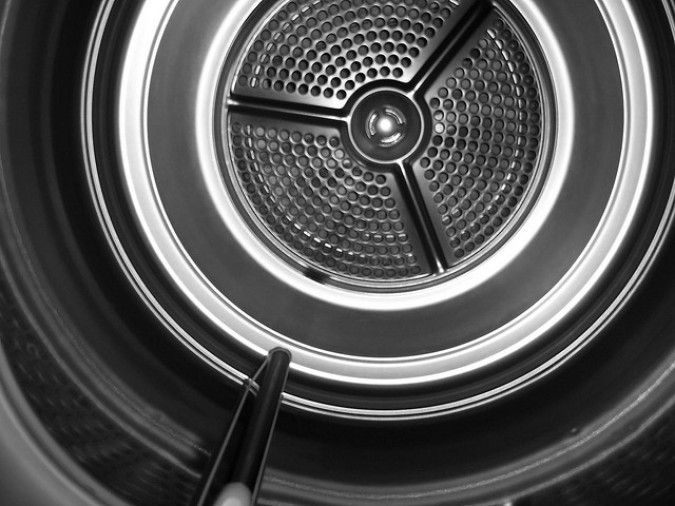Heat recovering clothes dryer to heat water
July 24, 2011 when I was falling asleep I thought of an idea I love. I plan to try this idea in my bus conversion.
Here’s the idea:
Place a car radiator in the exhaust flow of a clothes dryer. Pump water or another heat exchange liquid through tubing that connects the radiator to a heat storage tank. The fluid in that tank will warm, and that warm water can be piped through hydronic floor heating piping to heat the home.
This heat recovery could be meaningful, especially in households where the dryer gets used a lot.
Alternatively or in addition, the recovered clothes dryer heat could heat the domestic hot water supply, and that water could be used for the clothes washer. In effect the heat from the dryer could make the washer more energy efficient.
Alternatively or in addition, the recovered clothes dryer heat could be used to heat an aquaponics fish tank, which generally makes the fish eat more and gain weight faster. I understand that catfish grow fastest when their water temperature is 84 degrees fahrenheit. It takes a lot of energy to warm hundreds of gallons of water, so recycling heat from a dryer is a good idea.
Car radiators are cheap. I discovered this when buying the parts to build my sound proof engine box for my bus conversion.
My idea is so simple and inexpensive. It’s applicable to gas and electric dryers, and it makes sense for nearly every home in every country I can think of that has a clothes dryer. Why hasn’t such a system already been implemented?
Others have conceived of capturing waste heat from clothes dryers. Inventor Richard A. Brunner patented in the United States a system that from my quick read of the full text of the patent uses a heat exchanger to warm house air with moist air from the dryer vent. I didn’t see anything about heating water or using the hot water to heat the house or the water for a clothes washer, as I have described.
I suspect all the major clothes dryer companies have also considered heat recovery systems. The idea is not far fetched. I believe many industrial factories capture ‘waste’ heat from systems all the time for use elsewhere.
As I understand it, home heating forced air furnaces of high efficiency already recover heat from the first combustion process in a so-called second stage. I have been told these super efficient furnaces are trouble prone, but that they do work. I was advised not to buy one due to their complexity. But these dual stage furnaces apparently work by burning the exhaust, not just capturing heat from it. My dryer heat recovery system would be much simpler and cheaper to construct.
I have read about devices to capture heat from waste drain water, which often contains heated water. I suspect the amount of heat those devices recover is relatively small compared to the available heat that could be cost effectively recovered from a clothes dryer.
When I converted my Kenmore natural gas clothes dryer to propane so I could install it in my bus conversion, I temporarily operated the dryer with the front cover removed. I got to see the flame size, and I would say it’s similar to the size of flame that would be produced by running four stovetop cooking burners at once.
Yes, a lot of the heat is consumed evaporating water, but when I put my hand over the outside vent when my dryer is running, it seems like at least as much heat as a 1,500 watt space heater produces.
I suspect about 2/3rds of that heat could be captured in a hot water tank. A space heater produces about 5,000 btus of heat per hour, so 2/3rds of 5,000 is 3,333 btus. It takes about 1,000 watts of electricity worth say USD $.20 to run 2/3rds of a 1,500 watt space heater. So the captured heat from running a dryer by electricity for an hour is worth about USD $.20.
If the dryer is run for five loads a week, a dollar a week in energy is saved, or $52 a year. A dryer might last for ten years, so $520 worth of energy would be saved over the life of the dryer, or enough money to pay for the entire appliance.
But energy is getting more costly, so over ten years the savings might be 50% higher.
Every little bit helps.
Gas water heaters and furnaces should also have heat exchangers installed in their exhaust stacks. If a house is built with the hydronic piping for these heat exchangers in place, the cost to add these recovery systems should be affordable. However, it would be much better to eliminate the water heater and furnace in most homes, in favor of mandatory solar water heating for water and the air.
I think it is one of mankind’s dumbest moves to ignore the sun for most water and home heating worldwide, in favor of burning fossil fuels which really should be saved for fueling aircraft and spacecraft and making advanced plastics.
Why are we not burning oil at a rate such that it will last for 1,000 years? Or 10,000 years? Some say we’ve used up half the oil on the planet already, in what, 150 years? That’s a snap of the fingers. What will we do in three snaps? Go back to sailing ships? Yes, by then we might figure out cold fusion or oil from algae such that it really substitutes for oil. But what if we don’t?
While I’m carrying on here, I should say that clothes dryers themselves are rather ridiculous when air drying clothes makes them last longer and is free. Garages should have enough clothes lines to dry multiple dryer loads of laundry, and garages should have fans that exhaust to the outside so that drying times can be reduced substantially. Outdoor clothes lines should be allowed everywhere, by law, in the same way that television satellite dishes are allowed everywhere in the United States by law. As I understand it, no contract can take away the right to install your own satellite dish. The exception is if you have free access to a community satellite dish.
Some housing complexes have legally enforceable covenants that forbid outdoor clothes lines, and your house can be foreclosed on and sold if you violate these contractual regulations. Such provisions should be against public policy and automatically be void and unenforceable.
Sadly, wet clothes don’t have the powerful lobby that the satellite television reception industry pays a lot of money to employ.


